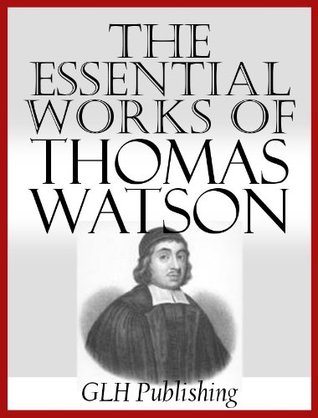- Bible
- Read the Bible
- Bible Versions
- Verse of the Day
- Reading Plans
- Verses by Topic
- Books of the Bible
- Bible Images
- Study
- Commentaries
- Concordances
- Dictionaries
- Encyclopedias
- Sermons
- Bible Atlas & Maps
- BP Wiki
- Devotionals
- Today's Devotionals
- Light of the World
- All Devotionals
- Inspirational Quotes
- More
- Picture Quotes
- Videos
- Inspirational
- Bible Study
- What The Bible Says
- Bible Q&As
- Daily Bread
- Bible by Genre
- Bible Stories
- Random Bible Verse
- Community
- Store
The Essential Works Of Thomas Watson
by Thomas Watson
The Essential Works of Thomas Watson includes 15 classic writings from the beloved Puritan.
Contents:
-A Body Of Divinity
-The Doctrine Of Repentance
-A Divine Cordial (All Things For Good)
-Religion Our True Interest (The Great Gain Of Godliness)
-The Godly Man's Picture (Abridged)
-The Beatitudes
-The Art Of Divine Contentment
-The Lord's Prayer
-The Ten Commandments
-The Christian Soldier, or Heaven Taken By Storm
-The Mischief Of Sin
-The Christian's Charter
-The Duty Of Self-Denial
-A Christian On The Mount: A Treatise Concerning Meditation
-Sermon On The Eve Of The Great Ejection
Contents:
-A Body Of Divinity
-The Doctrine Of Repentance
-A Divine Cordial (All Things For Good)
-Religion Our True Interest (The Great Gain Of Godliness)
-The Godly Man's Picture (Abridged)
-The Beatitudes
-The Art Of Divine Contentment
-The Lord's Prayer
-The Ten Commandments
-The Christian Soldier, or Heaven Taken By Storm
-The Mischief Of Sin
-The Christian's Charter
-The Duty Of Self-Denial
-A Christian On The Mount: A Treatise Concerning Meditation
-Sermon On The Eve Of The Great Ejection
BUY NOW
Kindle Edition
Published August 25th 2011 by GLH Publishing
© 2025 Bibleportal.com All rights reserved.

He was educated at Emmanuel College, Cambridge, where he was noted for remarkably intense study. In 1646 he commenced a sixteen year pastorate at St. Stephen's, Walbrook. He showed strong Presbyterian views during the civil war, with, however, an attachment to the king, and in 1651 he was imprisoned briefly with some other ministers for his share in Christopher Love's plot to recall Charles II of England.
He was released on 30 June 1652, and was formally reinstated as vicar of St. Stephen's Walbrook. He obtained great fame and popularity as a preacher until the Restoration, when he was ejected for nonconformity. Not withstanding the rigor of the acts against dissenters, Watson continued to exercise his ministry privately as he found opportunity. Upon the Declaration of Indulgence in 1672 he obtained a license to preach at the great hall in Crosby House. After preaching there for several years, his health gave way, and he retired to Barnston, Essex, where he died suddenly while praying in secret. He was buried on 28 July 1686.
Thomas Watson was an English, non-conformist, Puritan preacher and author.
He was educated at Emmanuel College, Cambridge, where he was noted for remarkably intense study. In 1646 he commenced a sixteen year pastorate at St. Stephen's, Walbrook. He showed strong Presbyterian views during the civil war, with, however, an attachment to the king, and in 1651 he was imprisoned briefly with some other ministers for his share in Christopher Love's plot to recall Charles II of England.
He was released on 30 June 1652, and was formally reinstated as vicar of St. Stephen's Walbrook. He obtained great fame and popularity as a preacher until the Restoration, when he was ejected for nonconformity. Not withstanding the rigor of the acts against dissenters, Watson continued to exercise his ministry privately as he found opportunity. Upon the Declaration of Indulgence in 1672 he obtained a license to preach at the great hall in Crosby House. After preaching there for several years, his health gave way, and he retired to Barnston, Essex, where he died suddenly while praying in secret. He was buried on 28 July 1686.
... Show more